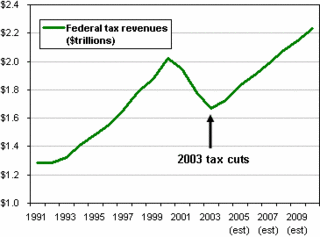
According to the LA Times:
White House budget officials said Wednesday that this year's federal deficit would be 22% smaller than expected, providing ammunition to supply-side advocates who contended that tax cuts helped pay for themselves.Since I think that a 2% of GDP deficit is optimal for an economy growing over 4% per year in nominal terms, I think we should be cutting tax rates again soon. Some day I'll get around to posting why I think it's good to always run a small deficit.
The revised budget forecast by the White House Office of Management and Budget projected a deficit of $333 billion for the fiscal year ending in September, $94 billion less than the administration estimated five months ago.
The deficit is forecast to be 2.7% of gross domestic product, a broad measure of the nation's economy. That would be an improvement over last year's $412-billion shortfall, which was 3.6% of GDP. The record, 6%, was set in 1983 after then-President Reagan's big tax cuts.
The NY Times is surprised by the main reason for the deficit shrinkage:
Why are they surprised? Every time you cut tax rates on the wealthy they end up paying more tax. It reduces transaction costs so they make more transactions, moving resources to where they are optimally deployed, which boosts economic growth. What could be simpler?The big surprise has been in tax revenue, which is running nearly 15 percent higher than in 2004. Corporate tax revenue has soared about 40 percent, after languishing for four years, and individual tax revenue is up as well.
Most of the increase in individual tax receipts appears to have come from higher stock market gains and the business income of relatively wealthy taxpayers.
The trade deficit is falling too:
And inflation is well under control:The U.S. trade deficit narrowed unexpectedly in May to $55.3 billion as exports rose slightly to a record and imports retreated a bit from the record set in April, a U.S. government report showed on Wednesday.
The smaller-than-expected trade gap suggested stronger-than-expected U.S. economic growth in the second quarter and could help persuade the Federal Reserve to remain on a path of steadily rising interest rates.
Inflation pressures on the consumer were absent for a second straight month in June, reflecting another drop in energy costs, the government reported Thursday.The Labor Department said that its Consumer Price Index was unchanged in June after having posted a 0.1 percent decline in May. [...]
If we don't cut tax rates soon, we'll be back to surpluses by the end of the decade. Though if we don't cut taxes, I'm sure our politicians will figure out a way to squander the surpluses on bogus spending - so no worries!
No comments:
Post a Comment